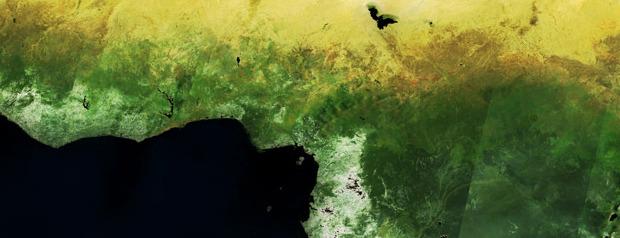Why Nigeria Should Think of itself as Central African – By Muktar Usman-Janguza

The ‘concentric circle‘ model which frames how Nigeria’s foreign policy thinkers view our region places the country exclusively in West Africa. Consequently West Africa has traditionally been the main focus of the country’s regional diplomacy.
West Africa also remains the arena of Nigeria’s boldest and most celebrated diplomatic initiatives to date – the establishment of ECOWAS in 1975 and the ECOMOG interventions of the 1990s.
I think this view of our broader region which situates Nigeria on the eastern edges of West Africa is incomplete. Instead our strategic thinkers should embrace the country’s natural identity as a potential pivotal power situated at a crossroad between multiple regions, and an anchor state linking West and Central Africa together.
Nigeria’s broader region also encompasses Central Africa. Therefore we should also join Central Africa’s principal regional organisation – the Economic Community of Central African States (ECCAS) – as an observer.
A Potential Pivotal Power and an Anchor State
Geographically, Nigeria shares land and sea boundaries with six countries: Benin, Cameroon, Chad, Equatorial Guinea, Niger, and Sao Tome and Principe. Of these, only Benin and Niger are West African states and members of ECOWAS. Our other four neighbours are Central African states and members of ECCAS. Our longest land boundary is with a Central African and ECCAS state: Cameroon.
Similarly, Nigeria’s most pressing security challenge – Boko Haram’s terrorist insurgency – is concentrated along our borders with our Central African neighbours, Cameroon and Chad. To all intents and purposes, given the serious security threat posed by Boko Haram, Nigeria’s defence diplomacy will be oriented towards our Central African border for the next few years.
Central Africa has a special place in Nigeria’s diplomatic and military history. Independent Nigeria’s first troop deployment abroad was to the Democratic Republic of Congo. A month after gaining independence, Nigeria volunteered an army contingent to join UN forces trying to quell the post-independence crisis that gripped that Central African country.
Similarly Nigeria’s first major military intervention abroad under its own initiative occurred in one of our Central African neighbours: Chad. Alarmed at the chaos on its north-eastern border as a result of Chad’s civil war, Nigeria deployed an 800-man peacekeeping force into the country in March 1979.
Its objective was to maintain order and provide breathing room for the rebels to hammer out a political settlement to the conflict. The mission failed. Nigeria, lacking the “political, economic and military leverage needed to impose peace on the factions in Chad”, withdrew its troops three months later.
Undeterred Nigeria again deployed troops in December 1981, but this time as part of a wider Nigerian-led multilateral effort under the auspices of the Organisation of African Unity. The initiative was driven from Lagos, the force was commanded by a Nigerian, and Nigeria provided the bulk of the troops, 2000 out of 3500.
This was Nigeria’s largest force deployment abroad, until the ECOMOG operations in West Africa of the 1990s. Hampered by acute logistical weaknesses and financial difficulties – and after Hissí¨ne Habré, backed by France and the US, seized power in June 1982 – Nigeria and the OAU force withdrew.
A year later Nigeria again resorted to military force – this time unilaterally – to dislodge occupying Chadian forces from a disputed Island in Lake Chad and protect Nigerian fishermen from the spill-over of Chad’s raging civil war. This sparked a three month-long crisis and intermittent border clashes from April-July 1983, killing an “estimated seventy-five Chadian soldiers and nine Nigerians“, until an agreement was signed on 11 July resolving the crisis.
Unfortunately these important interventions – especially the abortive peacekeeping attempts in March 1979 and December 1981-June 1982 – and the rich lessons that can be gleaned from them are largely absent from public discourse, due to the West Africa-centric prism through which we view Nigeria’s regional environment.
Economic, Historical and Cultural Ties
Nigeria’s economic linkages further reinforce the point that the country is as much a Central African as it is a West African country. UNCTAD’s recent report on intra-African trade show that all thirteen countries that count Nigeria as among their top five export partners are West and Central African states (pg. 22-27).
Five of these – CAR, Chad, Congo-Brazzaville, Gabon, and Sao Tome and Principe – are Central African and ECCAS countries. Similarly, of the eleven countries that count Nigeria as among their top five import partners, three – Cameroon, Chad, and Equatorial Guinea – are in Central Africa and ECCAS.
Nigeria’s own trade with the two regions however is heavily West Africa-centric. This is because West Africa is generally more developed than Central Africa, and because of the decades-long foreign and trade policy focus on West Africa.
The historical and cultural bonds between parts of Nigeria and some Central African states complete the linkages binding our country to the fate of its ECCAS neighbours. Fulanis make up about 9% of Nigeria’s population and about 10% of Cameroon’s. Kanuris constitute about 4% of Nigeria’s population and about 9% of Chad’s.
The Sokoto Caliphate, which sprouted from modern day north-western Nigeria in the early 19th century and grew to become the most powerful state in West Africa, at its height stretched eastwards covering virtually all of northern Cameroon, and small parts of Chad and the Central African Republic. Similarly the Kanem-Borno Empire, which originated in modern day north-eastern Nigeria in the 9th century, at its furthest extent in the 14th century encompassed almost all of Chad, northern Cameroon and small parts of the Central African Republic.
With African integration seemingly gathering pace – the agreement to establish the Tripartite Free Trade Area between the 26 member states of COMESA, EAC, and SADC, was signed on June 10 in Cairo, and the deadline for establishing a Continental Free Trade Area (CFTA) has been set for 2017 – joining ECCAS will leave Nigeria best placed to take the lead and advocate for harmonizing the integration agendas of West and Central Africa in preparation for the establishment of the CFTA.
In sum, joining ECCAS will broaden Nigeria’s strategic horizon and give our foreign policy planners a more accurate perspective of our regional location. It will also incentivise Nigeria to participate in shaping the economic and security environment of a long neglected part of our wider neighbourhood: Central Africa.
Discarding the old paradigm that sees Nigeria as lodged on the eastern edges of West Africa, and instead embracing the country’s natural identity as a pivotal power, an anchor state, a geostrategic gateway, and a connecting node linking West and Central Africa will widen our regional opportunities. It will also enrich our economic and cultural diplomacy.
Muktar Usman-Janguza is a geopolitical and security analyst. He can be contacted on twitter @JanguzaArewa or via email: [email protected]






I believe you have a clear perspective to the direction of where our national foreign policy should drive towards. The only issue you have not considered is the fact that Nigeria is an anglophone country while largely Central African States are francophone. Secondly, the borders of Nigeria that equally have influence of Cameroun includes the lower Eastern Nigerian States that otherwise could be seen as having key historical affiliations to Central African States. 9-10% of a nations population is not enough to determine the course of its foreign policy. The paper can address more factors that could necessitate the drive towards redirecting a national foreign policy from it current course. On the overall the paper is a good mind bogging fact that can resurrect deeper academic thoughts towards strategizing our foreign policy.
This article is insightful and very enlightening. It is difficult to disagree with any of the points raised here, and one hopes that this discourse can occur offline among those in positions of power. Thank you for this!
Interesting analysis but limited. Nigeria already has other effective tools other than integration to engage strategically with the central African region. Taking security as the locus, then the time-tested lake Chad Basin Commission which comprises key central African countries, like Cameroon, Chad, Niger is already emerging to be the pivotal institution for mutualizing efforts between Nigeria and central African countries.
I think given the challenges facing the continent, Africa needs a more organic-driven regional integration, shaped by shared problems rather than tweaking colonially constructed borders, which have proven to be very ineffective in taking the continent forward.
Environment based regional organizations, like river basin commissions including the lake chad and Mano River Basin are likely better options of leveraging collective actions in Africa to address emerging and remerging threats.
Emerging zones of strategic threats should define collective actions rather than top-down border-based regional integration institutions. Problem-solving organizations are more adaptable to deal with the border non-respecting strategic threats including Ebola and Boko Haram, in contrast to the ‘spaghetti bowl’ of regional integration organizations that continue to hold the continent backwards from greater union.